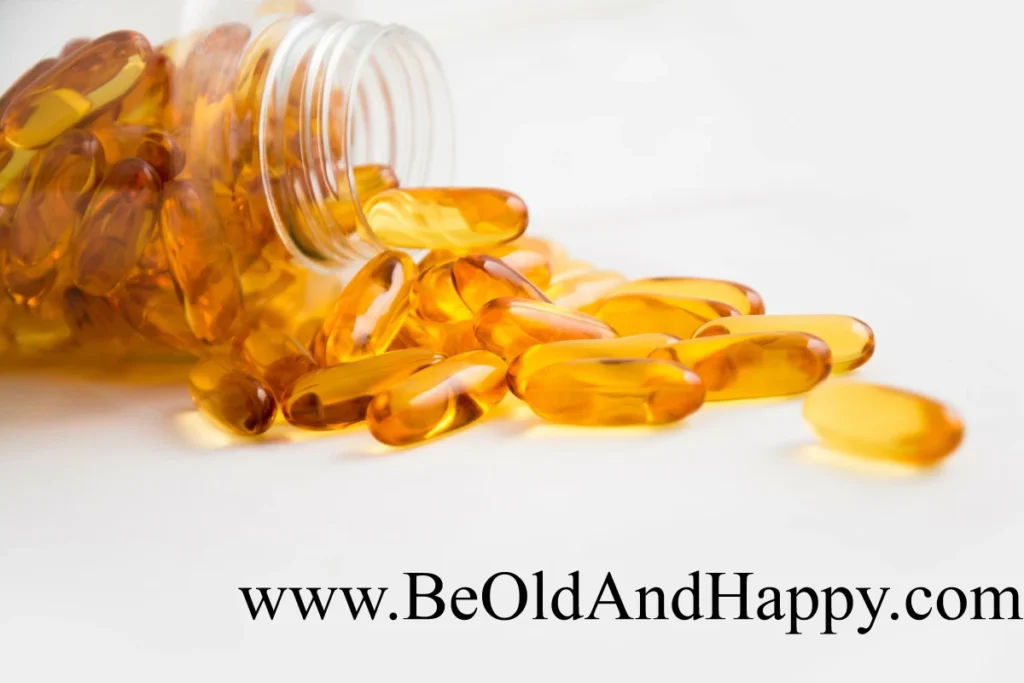Are you over 50 and wondering how to improve your health and well-being? Do you want to feel more energetic, vibrant, and youthful? Do you want to prevent or manage chronic diseases and age-related conditions? If you answered yes to any of these questions, then this blog post is for you!

In this ultimate guide to nutritional supplements for people over 50, we will show you why you need supplements, what the benefits of taking them are, and how to choose the right ones for your age and needs. We will also give you some tips on how to eat well and stay healthy after 50. By the end of this post, you will have all the information you need to make informed decisions about your health and happiness.
So let’s get started!
Why do you need supplements?
As you age, your body undergoes many changes that affect your nutritional status. Some of these changes include:
– Decreased appetite and food intake
– Reduced absorption and utilization of nutrients
– Increased loss of nutrients due to medications or health conditions
– Increased need for certain nutrients due to aging or disease prevention
These factors can lead to nutritional deficiencies that can impair your immune system, increase your risk of infections and inflammation, affect your bone health and muscle mass, impair your cognitive function and mood, and reduce your quality of life.
That’s why taking supplements can help you fill in the gaps in your diet and provide you with essential nutrients that you may not get enough of from food alone.
What are the benefits of taking supplements?
Taking supplements can offer many benefits for people over 50. Some of these benefits include:
– Boosting your energy levels and metabolism
– Supporting your immune system and fighting off infections
– Protecting your cells from oxidative stress and damage
– Enhancing your brain function and memory
– Improving your mood and mental health
– Supporting your bone health and preventing osteoporosis
– Preserving your muscle mass and strength
– Promoting your heart health and lowering your blood pressure
– Supporting your eye health and vision
– Improving your skin health and appearance
– Reducing your risk of chronic diseases such as diabetes, cancer, Alzheimer’s disease, etc.
How to choose the right supplements for your age and needs?

With so many supplements available on the market, it can be overwhelming and confusing to choose the right ones for your age and needs
. That’s why we have done the research for you and compiled a list of the best supplements over 50 that you should consider taking. We have also included a senior nutrition guide that will help you eat well and stay healthy after 50.
But before we dive into the details, here are some general tips on how to choose the right supplements for your age and needs:
– Consult your doctor before taking any supplements, especially if you have any medical conditions or take any medications.
– Read the label carefully and look for the ingredients, dosage, expiration date, and quality certification.
– Choose supplements that are made from natural sources, have minimal additives or fillers, and are tested for purity and potency.
– Follow the directions on how to take the supplements, such as when, how much, and with what to take them.
– Monitor your response to the supplements and adjust accordingly. If you experience any side effects or interactions, stop taking them and consult your doctor.
– Don’t expect miracles from supplements. They are not a substitute for a balanced diet, regular exercise, and a healthy lifestyle.
Now that you know the basics of choosing the right supplements for your age and needs, let’s move on to the next section of this blog post.
Supplements for Seniors: What You Need to Know
As we mentioned earlier, taking supplements can help you fill in the gaps in your diet and provide you with essential nutrients that you may not get enough of from food alone.
But with so many supplements on the market today, how do you know which ones are best for you?
How do you choose the right ones for your health goals? And how do you avoid wasting money on products that don’t work or might even harm you?
By the end of this post, you will have a clear idea of what supplements can do for you and how to use them safely and effectively.
We’ll break down everything you need to know about nutritional supplements for people over 50.
We will also review some of the most popular and effective supplements that can help you
boost your
immunity,
strengthen your bones,
protect your brain,
fight inflammation,
and increase your energy levels.
The Benefits of Nutritional Supplements for People Over 50
So what exactly can nutritional supplements do for you? Well, they offer a wide range of benefits that can enhance your physical and mental well-being. Here are just a few ways that these supplements can make a difference in your life:
1. Improved Energy Levels: As we age, it’s common to feel more fatigued and have lower energy levels. Nutritional supplements can help combat this by providing the nutrients your body needs to produce energy.
2. Enhanced Bone Health: Osteoporosis is a common concern for people over 50, especially women. Calcium and vitamin D supplements can help strengthen your bones and reduce the risk of fractures.
3. Boosted Immune System: As we age, our immune system becomes weaker, making us more susceptible to illness. Supplements like vitamin C and zinc can help support a healthy immune system and keep you feeling your best.
4. Cognitive Support: Many nutritional supplements contain ingredients that can support brain health and cognitive function. Omega-3 fatty acids, for example, have been shown to improve memory and reduce the risk of cognitive decline.
5. Joint Health: Joint pain and stiffness are common issues as we age. Supplements like glucosamine and chondroitin can help reduce inflammation and support joint health, allowing you to stay active and enjoy life’s pleasures like hiking and travel.
Supplements for Seniors: What You Need to Know
Are you over 50 and looking for ways to improve your health and well-being? Do you want to feel more energetic, stronger, and smarter? Do you enjoy training, hiking, and traveling with your friends and family? If you answered yes to any of these questions, then you might want to consider taking some supplements.
Supplements are products that contain vitamins, minerals, or other substances that can help you fill in the gaps in your diet and provide you with essential nutrients that you may not get enough of from food alone. But what are these nutrients and why are they important for people over 50? Here are some of the most common and beneficial supplements for seniors that you should consider taking:
– Vitamins:
These are organic compounds that your body needs to perform various functions, such as metabolism, immunity, vision, and growth. As you age, your body may not produce or absorb enough vitamins from food, which can lead to deficiencies and health problems. Some of the vitamins that are especially important for seniors are:
– Vitamin D: This vitamin is also known as the sunshine vitamin because your body can make it when your skin is exposed to sunlight. It is important for your bone health because it helps your body absorb calcium and phosphorus from food. It also supports your immune system, muscle function, heart health, and mood. However, as you age, your skin becomes less efficient at producing vitamin D from sunlight. Moreover, many people do not get enough vitamin D from food sources such as fatty fish, egg yolks, fortified milk, etc.
Vitamin D deficiency can cause osteoporosis, rickets, and increased risk of fractures. You can get vitamin D from sunlight exposure or from foods like fatty fish, eggs, and fortified milk. However, many people do not get enough vitamin D from these sources, especially in winter or if they have dark skin. That’s why taking a vitamin D supplement can be a good idea for seniors.
– Vitamin B12: This vitamin is involved in the production of red blood cells, DNA synthesis, and nerve function. It also helps prevent anemia and cognitive decline.
–Vitamin B12 deficiency can cause fatigue, weakness, numbness, tingling, memory loss, and depression. You can get vitamin B12 from animal products like meat, eggs, cheese, and milk. However, some people may have trouble absorbing vitamin B12 from food due to low stomach acid or certain medications. That’s why taking a vitamin B12 supplement can be beneficial for seniors.
– Vitamin C: This vitamin is a powerful antioxidant that protects your cells from free radical damage. It also boosts your immune system and helps you fight off infections.
–Vitamin C deficiency can cause scurvy, which is characterized by bleeding gums, loose teeth, bruising, and poor wound healing.
You can get vitamin C from fruits and vegetables like citrus fruits, berries, peppers, broccoli, and tomatoes.
However some people may not eat enough fruits and vegetables or may lose vitamin C during cooking or storage. That’s why taking a vitamin C supplement can be helpful for seniors.
– Minerals:
These are inorganic elements that your body needs to maintain its structure and function. They also help regulate your fluid balance, blood pressure, nerve impulses, muscle contractions, and enzyme activity. Some of the minerals that are especially important for seniors are:
– Calcium: This mineral is the main component of your bones and teeth. It also plays a role in muscle contraction, blood clotting, nerve transmission, and hormone secretion.
Calcium deficiency can lead to osteoporosis, which is a condition where your bones become weak and brittle.
You can get calcium from dairy products like milk, cheese, and yogurt.
However, some people may not consume enough dairy products or may have lactose intolerance or vegan diets. That’s why taking a calcium supplement can be useful for seniors.
– Magnesium: This mineral is involved in more than 300 biochemical reactions in your body. It helps maintain your bone health, muscle function, nerve function, blood sugar levels, and blood pressure.
Magnesium deficiency can cause muscle cramps, spasms, tremors, irregular heartbeat, insomnia, and anxiety.
You can get magnesium from foods like nuts, seeds, beans, leafy greens, and whole grains. However some people may not eat enough magnesium-rich foods or may have malabsorption or chronic diseases that affect magnesium levels. That’s why taking a magnesium supplement can be advantageous for seniors.
– Zinc: This mineral is essential for your immune system, wound healing, taste and smell, and DNA synthesis.
Zinc deficiency can impair your immune function, increase your risk of infections, delay your wound healing, and affect your appetite and taste.
You can get zinc from foods like meat, seafood, poultry, eggs, and dairy products. However, some people may not eat enough zinc-rich foods or may have vegetarian or vegan diets. That’s why taking a zinc supplement can be favorable for seniors.
– Coenzymes: These are molecules that help enzymes perform their functions.

Enzymes are proteins that catalyze chemical reactions in your body. Coenzymes are often derived from vitamins or minerals and act as cofactors or co-substrates for enzymes. Some of the coenzymes that are especially important for seniors are:
– Coenzyme Q10 (CoQ10): This coenzyme is involved in the production of energy in your cells. It also acts as an antioxidant and protects your cells from oxidative stress. CoQ10 levels tend to decline with age, which can affect your energy levels, heart health, and brain function.
You can get CoQ10 from foods like organ meats, fish, nuts, and spinach. However, some people may not eat enough CoQ10-rich foods or may have conditions that reduce CoQ10 synthesis or increase CoQ10 demand. That’s why taking a CoQ10 supplement can be beneficial for seniors.
– Alpha-lipoic acid (ALA): This coenzyme is also involved in the production of energy in your cells. It also acts as an antioxidant and helps regenerate other antioxidants like vitamin C and vitamin E. ALA may help improve blood sugar levels, nerve function, and cognitive function in seniors.
You can get ALA from foods like red meat, organ meats, broccoli, spinach, and tomatoes. However, some people may not eat enough ALA-rich foods or may have conditions that impair ALA metabolism or increase ALA demand. That’s why taking an ALA supplement can be useful for seniors.
– Acetyl-L-carnitine (ALC): This coenzyme is a derivative of the amino acid carnitine. It helps transport fatty acids into the mitochondria, where they are burned for energy. ALC may help improve energy levels, muscle function, heart health, and brain health in seniors.
You can get ALC from foods like meat, dairy products, and avocados. However, some people may not eat enough ALC-rich foods or may have conditions that reduce ALC synthesis or increase ALC demand. That’s why taking an ALC supplement can be advantageous for seniors.
As you can see, taking supplements can help you enhance your bone health, boost your immune system, support your cognitive function, and improve your joint health. However, not all supplements are created equal.
You need to choose the best supplements for seniors that suit your needs and preferences. Here are some tips on how to do that:

– Consult your doctor before taking any supplements. Your doctor can advise you on which supplements are safe and effective for you based on your medical history, medications, allergies, and other factors.
– Read the labels carefully. Look for supplements that contain the right amount and form of the nutrients you need. Avoid supplements that contain unnecessary additives, fillers, binders, colors, flavors, or preservatives.
– Check the reviews and ratings of the supplements you are interested in. Look for honest and unbiased feedback from other customers who have used the supplements. Pay attention to their experiences, results, side effects, and satisfaction.
– Compare the prices and quality of the supplements you are considering. Look for supplements that offer good value for money without compromising on quality. Avoid supplements that are too cheap or too expensive.
Taking supplements can be a great way to improve your health and well-being as a senior. However, you need to be smart and careful when choosing the best supplements for seniors that work for you. By following these tips, you can find the supplements that will help you achieve your health goals and enjoy life to the fullest.
The 5 Best Nutritional Supplements for People Over 50

Now that you understand the benefits of nutritional supplements, let’s take a look at some of the best ones to incorporate into your daily routine. These five are my choices, what is fitting to my lifestyle. But regularly I pick from the longer list above as well:
1. Multivitamin: A high-quality multivitamin is a great foundation for any supplement regimen. Look for one specifically formulated for people over 50, as it will contain the right balance of vitamins and minerals for your age group.
2. Vitamin D: Many people over 50 are deficient in vitamin D, which is essential for bone health. Look for a vitamin D3 supplement, as it is the most easily absorbed form.
3. Omega-3 Fatty Acids: These essential fats are crucial for brain health and can also support heart health. Look for a fish oil supplement that contains both EPA and DHA.
4. Coenzyme Q10: This powerful antioxidant can support heart health and provide an energy boost. Look for a ubiquinol form for better absorption.
5. Probiotics: Gut health becomes even more important as we age. Look for a probiotic supplement that contains a variety of strains to support digestion and immune function.
Remember, it’s always best to consult with a healthcare professional before starting any new supplement regimen. They can help determine which supplements are right for you based on your individual needs and any medications you may be taking.
In Conclusion
Taking nutritional supplements can be a game-changer when it comes to your health and well-being as you age. From improved energy levels to enhanced bone health, these supplements offer a wide range of benefits that can support your overall quality of life. Just remember to choose high-quality supplements, consult with a healthcare professional, and combine them with a healthy diet and lifestyle for optimal results. So go ahead, embrace the power of nutritional supplements and enjoy all that life has to offer!
FAQs
Q1: Can I take multiple nutritional supplements at once?
A1: While it’s generally safe to take multiple supplements, it’s always best to consult with a healthcare professional first. They can ensure that you’re not exceeding recommended doses or risking any potential interactions.
Q2: Are there any side effects of taking nutritional supplements?
A2: Most nutritional supplements are safe when taken as directed. However, some individuals may experience mild side effects such as digestive upset or allergic reactions. If you experience any adverse effects, discontinue use and consult with a healthcare professional.
Q3: How long does it take to see results from taking nutritional supplements?
A3: The time it takes to see results can vary depending on the supplement and individual factors. Some supplements may provide immediate benefits, while others may take several weeks or months of consistent use to see noticeable changes.
Q4: Can I get all the nutrients I need from food alone?
A4: While a healthy diet is essential, it can be challenging to get all the nutrients you need from food alone, especially as you age. Nutritional supplements can help fill in the gaps and ensure you’re getting the right balance of nutrients.
Q5: Are there any specific supplements recommended for women over 50?
A5: Women over 50 may benefit from additional calcium and vitamin D supplements to support bone health. It’s also important to consider supplements that support heart health, cognitive function, and hormonal balance.
About the author : Peter Pal
Latest videos
Join our mailing list today
Insider offers & flash sales in your inbox every week.
Curabitur non nulla sit amet nisl tempus convallis quis ac lectus dolor sit amet, consectetur adipiscing elit sed porttitor lectus.



